Acer Liquid E1 Operating Instructions
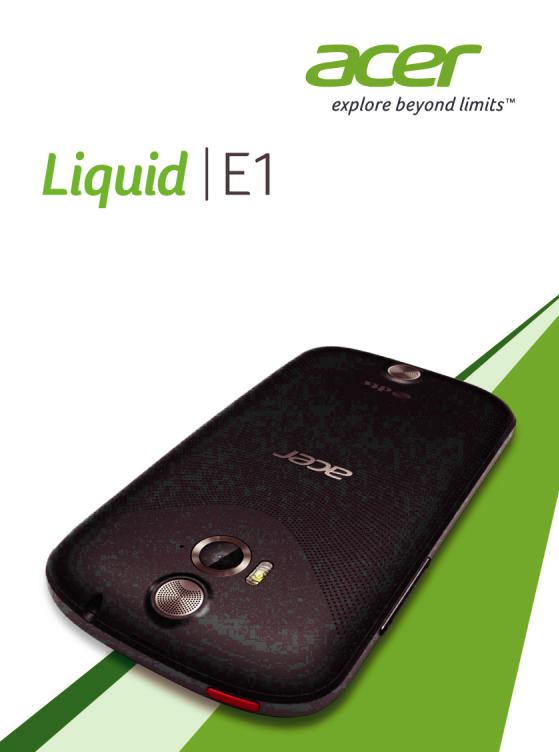
© 2013 All Rights Reserved
Acer Liquid E1 V360 User’s Manual Model: V360
First issue: 2/2013
Acer Liquid E1 V360 Smartphone
Model number: __________________________________
Serial number: ___________________________________
Date of purchase: ________________________________
Place of purchase: ________________________________

Table of contents
Table of contents . . . . . . . . . . . . . . . . . . . . . . . . . . . . . . . . . . . . . . . . . . 3
Setting up . . . . . . . . . . . . . . . . . . . . . . . . . . . . . . . . . . . . . . . . . . . . . . . . 5
Unpacking your smartphone . . . . . . . . . . . . . . . . . . . . . . . . . . . . . . . . . . . . . . . . 5 Getting to know your smartphone . . . . . . . . . . . . . . . . . . . . . . . . . . . . . . . . . . . . 5 Installing or removing the battery . . . . . . . . . . . . . . . . . . . . . . . . . . . . . . . . . . . . 6 Installing a SIM or microSD Card . . . . . . . . . . . . . . . . . . . . . . . . . . . . . . . . . . . . 8
Using your smartphone. . . . . . . . . . . . . . . . . . . . . . . . . . . . . . . . . . . . 10
Turning on for the first time . . . . . . . . . . . . . . . . . . . . . . . . . . . . . . . . . . . . . . . . 10 Locking your smartphone . . . . . . . . . . . . . . . . . . . . . . . . . . . . . . . . . . . . . . . . . 10 Using the touchscreen. . . . . . . . . . . . . . . . . . . . . . . . . . . . . . . . . . . . . . . . . . . . 11 The Home screen . . . . . . . . . . . . . . . . . . . . . . . . . . . . . . . . . . . . . . . . . . . . . . . 13
Managing contacts. . . . . . . . . . . . . . . . . . . . . . . . . . . . . . . . . . . . . . . . 21
Managing your contacts . . . . . . . . . . . . . . . . . . . . . . . . . . . . . . . . . . . . . . . . . . 21
Making calls . . . . . . . . . . . . . . . . . . . . . . . . . . . . . . . . . . . . . . . . . . . . . 22
Before making a call . . . . . . . . . . . . . . . . . . . . . . . . . . . . . . . . . . . . . . . . . . . . . 22 Making a call . . . . . . . . . . . . . . . . . . . . . . . . . . . . . . . . . . . . . . . . . . . . . . . . . . . 22 The voice call screen. . . . . . . . . . . . . . . . . . . . . . . . . . . . . . . . . . . . . . . . . . . . . 23
Internet calling . . . . . . . . . . . . . . . . . . . . . . . . . . . . . . . . . . . . . . . . . . . 26
Adding an Internet calling account . . . . . . . . . . . . . . . . . . . . . . . . . . . . . . . . . . 26 Editing or removing an Internet calling account. . . . . . . . . . . . . . . . . . . . . . . . . 26 Using Internet calling . . . . . . . . . . . . . . . . . . . . . . . . . . . . . . . . . . . . . . . . . . . . . 26 Receiving Internet calls . . . . . . . . . . . . . . . . . . . . . . . . . . . . . . . . . . . . . . . . . . . 26 Calling a contact’s Internet calling address . . . . . . . . . . . . . . . . . . . . . . . . . . . . 26 Calling a phone number using Internet calling . . . . . . . . . . . . . . . . . . . . . . . . . 26
Messaging. . . . . . . . . . . . . . . . . . . . . . . . . . . . . . . . . . . . . . . . . . . . . . . 28
Creating a new message. . . . . . . . . . . . . . . . . . . . . . . . . . . . . . . . . . . . . . . . . . 28 Replying to a message . . . . . . . . . . . . . . . . . . . . . . . . . . . . . . . . . . . . . . . . . . . 29 MMS messages. . . . . . . . . . . . . . . . . . . . . . . . . . . . . . . . . . . . . . . . . . . . . . . . . 29
Going online . . . . . . . . . . . . . . . . . . . . . . . . . . . . . . . . . . . . . . . . . . . . . 31
Browsing the Internet. . . . . . . . . . . . . . . . . . . . . . . . . . . . . . . . . . . . . . . . . . . . . 31 Setting up your Google email . . . . . . . . . . . . . . . . . . . . . . . . . . . . . . . . . . . . . . 32 Composing an email . . . . . . . . . . . . . . . . . . . . . . . . . . . . . . . . . . . . . . . . . . . . . 32 Setting up Email . . . . . . . . . . . . . . . . . . . . . . . . . . . . . . . . . . . . . . . . . . . . . . . . 32 Maps, Navigation, Places and Latitude . . . . . . . . . . . . . . . . . . . . . . . . . . . . . . . 34
AcerCloud setup . . . . . . . . . . . . . . . . . . . . . . . . . . . . . . . . . . . . . . . . . 36
AcerCloud setup for Windows 7 . . . . . . . . . . . . . . . . . . . . . . . . . . . . . . . . . . . . 36
Using the Camera. . . . . . . . . . . . . . . . . . . . . . . . . . . . . . . . . . . . . . . . . 39
Camera icons and indicators . . . . . . . . . . . . . . . . . . . . . . . . . . . . . . . . . . . . . . . 39 Taking a photo. . . . . . . . . . . . . . . . . . . . . . . . . . . . . . . . . . . . . . . . . . . . . . . . . . 40 Shooting a video . . . . . . . . . . . . . . . . . . . . . . . . . . . . . . . . . . . . . . . . . . . . . . . . 42 Viewing photos and videos . . . . . . . . . . . . . . . . . . . . . . . . . . . . . . . . . . . . . . . . 42 Geotagging . . . . . . . . . . . . . . . . . . . . . . . . . . . . . . . . . . . . . . . . . . . . . . . . . . . . 42
Advanced settings . . . . . . . . . . . . . . . . . . . . . . . . . . . . . . . . . . . . . . . . 43
Putting your smartphone in Airplane mode . . . . . . . . . . . . . . . . . . . . . . . . . . . . 43 Adjusting settings . . . . . . . . . . . . . . . . . . . . . . . . . . . . . . . . . . . . . . . . . . . . . . . 43 Connecting to a PC . . . . . . . . . . . . . . . . . . . . . . . . . . . . . . . . . . . . . . . . . . . . . . 47 FM radio . . . . . . . . . . . . . . . . . . . . . . . . . . . . . . . . . . . . . . . . . . . . . . . . . . . . . . 48 Multimedia playback . . . . . . . . . . . . . . . . . . . . . . . . . . . . . . . . . . . . . . . . . . . . . 48 Restoring to factory settings . . . . . . . . . . . . . . . . . . . . . . . . . . . . . . . . . . . . . . . 49
Accessories and tips . . . . . . . . . . . . . . . . . . . . . . . . . . . . . . . . . . . . . . 51
Using the headset . . . . . . . . . . . . . . . . . . . . . . . . . . . . . . . . . . . . . . . . . . . . . . . 51 Using a Bluetooth headset . . . . . . . . . . . . . . . . . . . . . . . . . . . . . . . . . . . . . . . . 51 Inserting a microSD Card . . . . . . . . . . . . . . . . . . . . . . . . . . . . . . . . . . . . . . . . . 51
Appendix. . . . . . . . . . . . . . . . . . . . . . . . . . . . . . . . . . . . . . . . . . . . . . . . 52
FAQ and troubleshooting. . . . . . . . . . . . . . . . . . . . . . . . . . . . . . . . . . . . . . . . . . 52 Other sources of help . . . . . . . . . . . . . . . . . . . . . . . . . . . . . . . . . . . . . . . . . . . . 53 Warnings and precautions. . . . . . . . . . . . . . . . . . . . . . . . . . . . . . . . . . . . . . . . . 53 Emergency calls . . . . . . . . . . . . . . . . . . . . . . . . . . . . . . . . . . . . . . . . . . . . . . . . 56 Taking care of your smartphone . . . . . . . . . . . . . . . . . . . . . . . . . . . . . . . . . . . . 56 Specifications . . . . . . . . . . . . . . . . . . . . . . . . . . . . . . . . . . . . . . . . . . . . . . . . . . 58 Safety . . . . . . . . . . . . . . . . . . . . . . . . . . . . . . . . . . . . . . . . . . . . . . . . . . . . . . . . 60
End User License Agreement . . . . . . . . . . . . . . . . . . . . . . . . . . . . . . . 68
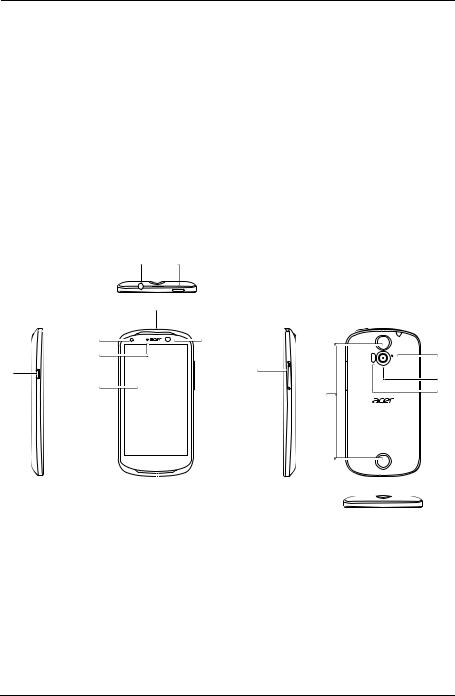
Setting up
Unpacking your smartphone
Your new smartphone comes packed in a protective box. Carefully unpack the box and remove the contents. If any of the following items is missing or damaged, contact your dealer immediately:
•Acer Liquid E1 V360 Smartphone
•Battery
•Quick Guide
•USB cable
•AC adapter
•Headset
Getting to know your smartphone
Views
2 |
3 |
|
|
|
4 |
|
|
5 |
7 |
|
|
6 |
|
12 |
|
1 |
10 |
13 |
|
|
|||
8 |
|
||
11 |
14 |
||
|
|||
|
|
|
|
|
|
9 |
|
|
|
|
|
No. |
Item |
Description |
||
1 |
Micro USB connector |
Connects to a USB cable/charger. |
||
|
|
|
|
|
2 |
3.5 mm headphone jack |
Connects to stereo headphones. |
||
|
|
|
|
|
3 |
Power button |
Press to turn the screen on/off or enter sleep |
||
|
|
|
mode; press and hold to turn the smartphone on |
|
|
|
|
or off. |
|
|
|
|
|
|
4 |
Phone speaker |
Emits audio from your smartphone; suitable for |
||
|
|
|
holding to your ear. |
|
|
|
|
|
|
5

No. |
Item |
Description |
5 |
Front-facing camera |
A 0.3-megapixel camera for video chats and self |
|
|
portrait images. |
|
|
|
6 |
LED indicator |
Indicates the phone’s battery, call, and message |
|
|
status (see table below). |
7 |
Light sensor |
Detects ambient light and automatically adjusts |
|
|
screen brightness. |
|
|
|
8 |
Touchscreen |
4.5-inch, 960 x 540 pixel capacitive touchscreen |
|
|
to display data, phone content and enter |
|
|
information. |
9 |
Microphone |
Internal microphone. |
|
|
|
10 |
Volume up/down buttons |
Increases or decreases the phone volume. |
|
|
|
11 |
Handsfree stereo |
Emits stereo audio from your smartphone; |
|
speakers |
suitable for handsfree use. |
|
|
|
12 |
Microphone |
Receives audio for video recording. |
|
|
|
13 |
Rear camera |
A 5-megapixel camera for taking high-resolution |
|
|
images. |
|
|
|
14 |
Flash |
LED flash for camera. |
|
|
|
LED Indicators |
|
|
Status |
Description |
Blinks red every |
Low battery, not plugged in (only in sleep mode). |
eight seconds |
|
|
|
Blinks red every |
Critically low battery, not plugged in (only in sleep mode). |
three seconds |
|
|
|
Blinks red every two |
Bad battery or charging error. |
seconds |
|
Red |
Charging. |
|
|
Green |
Fully charged, plugged in. |
|
|
Blinks green every |
Missed call, voice mail, or new message (only in sleep mode). |
ten seconds |
|
|
|
Blue |
Plugged in but not ready / not enough charge to power on. |
|
Leave the device plugged in and try again later. |
Installing or removing the battery
Your smartphone uses a replaceable battery to provide power. It is packed separately from your smartphone and needs to be inserted and charged before you can use the smartphone.
6
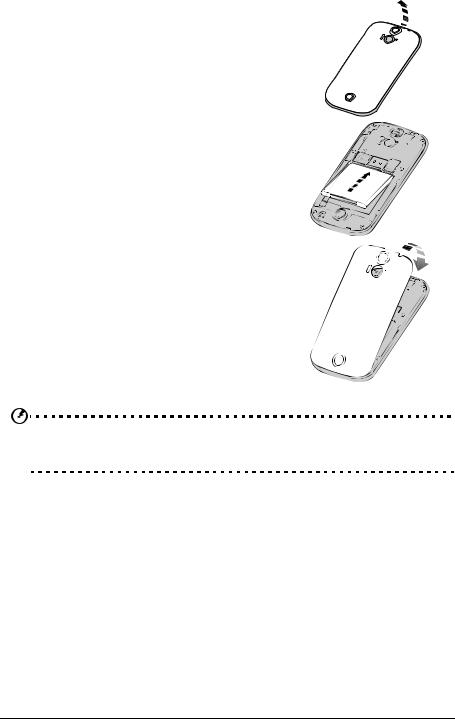
Installing the battery
Insert your fingernail into the cutout between the battery cover and the phone. Unclip the cover and lift off the battery cover.
Place the battery into the battery compartment, lining up the battery connectors with those at the top of the compartment.
Align the tabs on the cover into the slots on the phone. Gently press the cover until it snaps in place.
CAUTION: RISK OF EXPLOSION IF BATTERY IS REPLACED BY AN INCORRECT TYPE.
DISPOSE OF USED BATTERIES ACCORDING TO THE INSTRUCTIONS.
Charging the battery
For initial use, you need to charge your smartphone for eight hours. After that you can recharge the battery as needed.
7
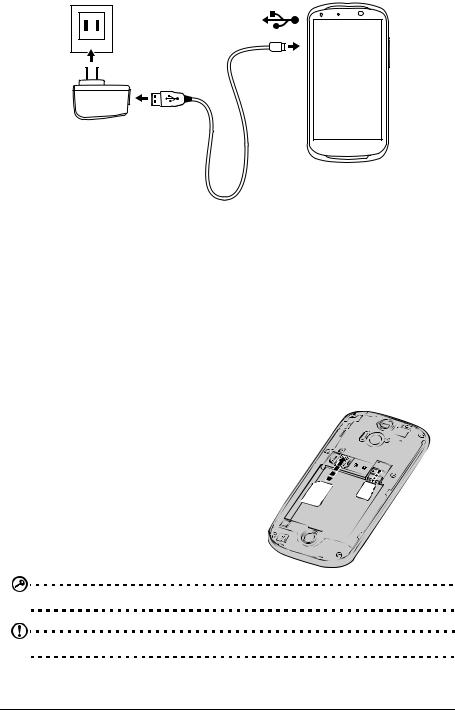
Connect the AC adapter cord to the micro USB connector on your smartphone.
Removing the battery
Open the battery compartment as shown in "Installing the battery" on page 7. Lift the battery out of the compartment by lifting at the top of the battery on either side of the camera.
Replace the battery cover as described above.
Installing a SIM or microSD Card
To take full advantage of your smartphone’s telephony capabilities, you must install a SIM card. The SIM card holder is located at the top of the battery bay.
Additionally, you may wish to increase your smartphone’s storage by inserting a microSD Card into the slot provided. This is next to the SIM card slot.
1. Turn off the phone by pressing and holding the power button.
2. Open the cover and remove the battery as described in "Removing the
battery" on page 8. 3. Insert the SIM or microSD Card as
shown.
4. Replace the battery and battery cover.
Important: Turn off your phone before installing or removing the microSD Card.
Note: Ensure that the microSD Card is inserted all the way into the card slot.
8

SIM card lock
Your smartphone may come with a SIM card lock, i.e., you will only be able to use the SIM card provided by your network operator.
To cancel the SIM lock, contact your network provider.
9

Using your smartphone
Turning on for the first time
To turn on your smartphone for the first time, press and hold the power button until the screen turns on. You will then be asked to configure some settings before you can use your smartphone.
Follow the onscreen instructions to complete setup.
Sign in to or create a Google account
If you have Internet access, your smartphone allows you to synchronize information with a google account.
During the start-up process, you may create or sign in to your account, which will be used to synchronize your contact list, email, calendar and other information. If you do not yet have Internet access, or do not want to use this feature, then tap Skip.
Creating multiple Google accounts
You can create and easily access multiple Google accounts. Open the Application menu and then tap Settings > Add account.
Entering your PIN
When you install a SIM card for the first time, you may need to enter a PIN using the onscreen number pad.
Important: Depending on your settings, you may be required to enter your PIN each time you switch on the phone function.
Activating a new SIM card
If you are using your SIM card for the first time, it may require activation. Contact your network operator for details on how to do this.
Locking your smartphone
If you will not use your smartphone for a while, briefly press the power button to lock access. This saves power and ensures your smartphone does not unintentionally use any services. Your smartphone will lock automatically if it is not used for one minute.
10
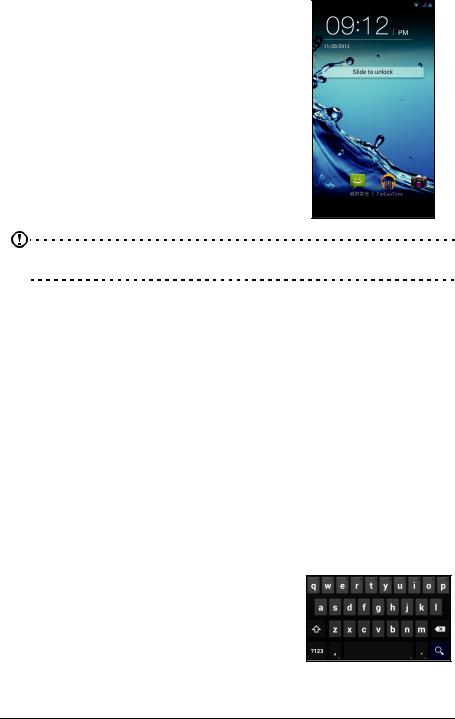
Waking your smartphone
If the screen is off and the smartphone does not react to any taps on the screen or front panel button, then it has been locked and is in sleep mode.
Press the power button to wake your smartphone. Unlock your smartphone by sliding your finger from one side of the screen to the other (it works both ways).
For additional security, you may set an unlock pattern, a set of dots that must be touched in the correct order to access the phone. Open the
Application menu and then tap Settings > Security > Screen lock.
Note: If you forget your unlock pattern, please refer to "Unlock pattern" on page 53.
You may also directly enter the lock screen applications at the bottom of the screen. Tap the icon and slide your finger to the left or right across to quickly access the application. To change the lock screen applications, see "Managing the lock screen" on page 17.
Using the touchscreen
Your smartphone uses a touchscreen for selecting items and entering information. Use your finger to tap the screen.
Tap: Touch the screen once to open items and select options.
Drag: Hold your finger on the screen and drag across the screen to select text and images.
Tap and hold: Tap and hold an item to see a list of actions available for that item. On the pop-up menu that appears, tap the action you want to perform.
Scroll: To scroll up or down the screen, simply drag your finger up or down the screen in the direction that you want to scroll.
Android keyboard
This is a standard onscreen QWERTY keyboard that allows you to enter text. Tap and hold a key with numbers at the top to select alternative characters, such as letters with accents.
Tap the ?123 button to see numbers and special characters, and then tap the ALT key to see even more.
11
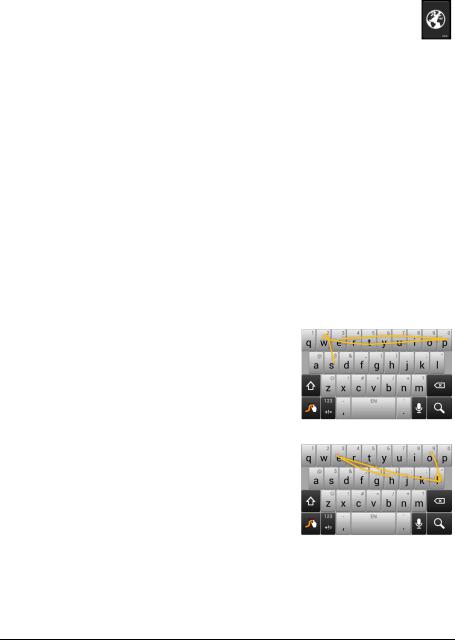
You can choose another input language by tapping and holding the comma key. Alternatively, you can open the Application menu and then tap Settings > Language & input. Then tap the Settings button next to "Android keyboard" > Input languages. The keyboard layout changes according to the selected language.
After setting up more than one language, the world button appears next to the space bar. Tap this button to quickly toggle between multiple input languages.
Text assistance
The Android keyboard has various features that assist you to enter correct text. In the Application menu, tap Settings > Language & input and then tap the Settings button to the right of Android keyboard. From here you can enable or disable several keyboard-related settings.
Changing the text input method
To change the input method, in the Application menu tap Settings > Language & input > Default and then select your preferred input method.
Predictive text
Both Swype and Android keyboard provide predictive text input for the browser. As you tap the letters of a word, a selection of words are displayed above the keyboard that continue the sequence of letters tapped, or are a close match allowing for errors. The word list changes after every key press. If the word you need is displayed, you can tap on it to insert it into your text.
Swype
Swype is a fast way to enter text. It allows you to type with one continuous motion across the screen keyboard; you create a word by drawing through letters.
Put your finger on the first letter of the word and draw a path from letter to letter, lifting up only after the last letter. Swype will insert spaces where necessary.
Swype will usually add a double letter in a word when needed, but you can help Swype recognize you want a double letter by scribbling slightly or making a loop on the letter. For example, to get the "ll" in "hello", scribble (or make a loop) on the "l" key.
12
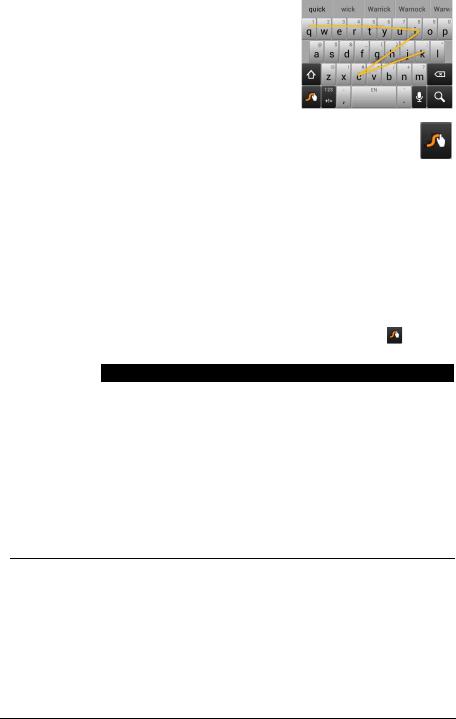
When there are multiple suggestions for the word you want to enter, Swype displays a Word Choice List. To accept the default word in the Word Choice List, just keep Swyping. Otherwise, scroll through the list by dragging your finger, and tap the word you want.
Press and hold the Swype key to access settings, features, updates, preferences, and help.
Tap the +!= button to see numbers and special characters; tap the page (shift) key to see even more.
Additional keys vary depending on the type of text you enter, e.g. a key to add a smiley is available when typing a text message. Like other keys, tap and hold for additional options.
To change the input method, open the Notification area (see "Status and notification area" on page 17.) and tap Choose input method.
Text assistance
The Swype keyboard has various features that assist you to enter correct text. In the
Application menu, tap Settings > Language & input and then tap the Settings
button to the right of Swype. You can also tap and hold the Swype key . From here you can enable or disable the following:
Function |
Description |
How to Swype |
Learn how to use the Swype keyboard. |
|
|
Preferences |
Change your text input preferences. |
|
|
Language |
Set the language used by the keyboard. |
Options |
|
|
|
Swype Connect |
• Add contact names and words used in posts to your personal |
|
dictionary. |
|
• Change data settings. |
|
|
Personal |
Check words added you your personal dictionary. |
dictionary |
|
|
|
Updates |
Check for application and dictionary updates. |
The Home screen
After rebooting, your smartphone will display the home screen. This screen gives you quick access to information and simple controls with widgets or shortcuts. These
13
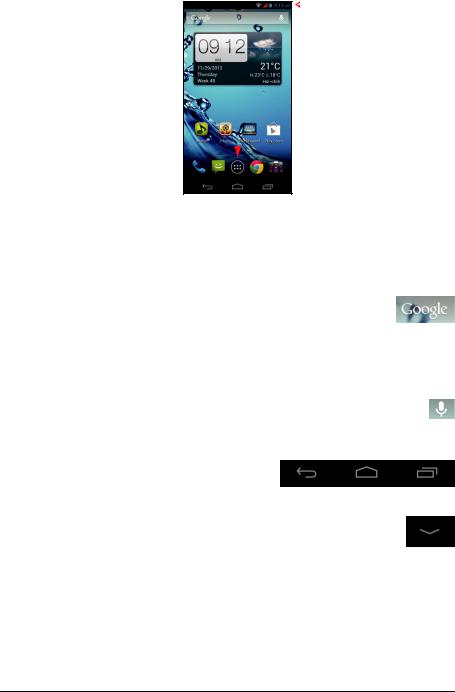
display information such as the time and weather, or provide additional controls and direct access to applications and other frequently used features of your smartphone.
 Time and Status
Time and Status
Search 
 Application menu
Application menu
Navigation 
At the bottom of the screen is the application dock which displays default applications. Tap an icon to open the application. Tap the Application icon in the middle of the application dock to view your applications. To change applications, see
"Changing application dock icons" on page 16.
Search
To search for applications, files or for information on the Internet, tap the Google icon in the top-left corner.
Simply enter the text you want to find and tap  or tap one of the suggestions, applications or files shown in the list.
or tap one of the suggestions, applications or files shown in the list.
Voice search
If voice search is available, tap the microphone and speak your search request. See "Voice search" on page 31.
Navigation
To navigate through menus and options, three (or more) icons are shown in the bottom-left corner.
Back |
Back |
Home |
|
|
Tap this icon to go to the previous page, or to go up one level in a menu. This icon may be replaced with the hide icon in certain cases (such as if the keyboard or list of recent applications is shown).
Home
Tap this icon to go directly to the Home screen.
Recent
Recent
Hide
Tap this icon to see recently opened applications. Tap an application to open it, or tap anywhere on the screen to return to the Home screen. See "Multitasking" on page 20.
14
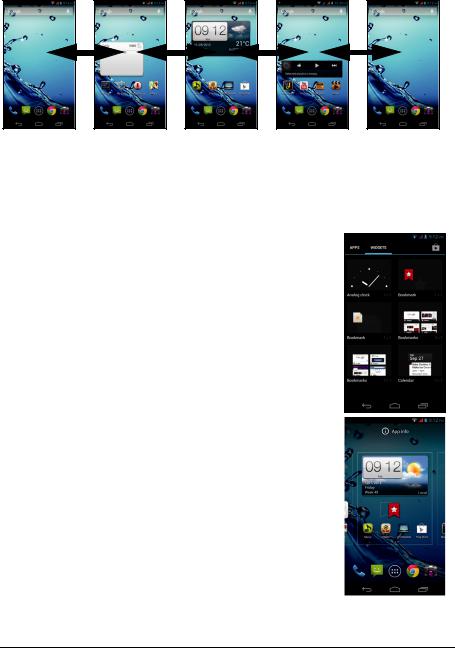
The extended Home screen
The Home screen extends to either side of the screen, giving you more room to add icons, widgets or features. To view the extended screen, slide your finger to the left or right.
Personalizing the Home screen
You may personalize your Home screen by adding or removing application shortcuts or widgets, and by changing the wallpaper.
Adding and removing shortcuts and widgets
To add shortcuts or widgets, tap the Application menu icon in the bottom-center of the Home screen.
Tap APPS to see a list of shortcuts to applications you can drag to a Home screen.
Tap WIDGETS to see small applications and links (such as custom shortcuts, contacts or bookmarks) that you can add to a Home screen. Widgets are small applications that display constantly-updated information or quick shortcuts to applications or special functions.
To move an App or Widget to the Home screen, tap and hold an item until it is selected. The Home screen will open. Drag the item to any free area on the screen. To view information about the App or Widget, drag it to the icon at the top of the screen.
To move the item to a different Home screen, drag it to the side of the screen, the Home screen will switch to the screen in that direction. Release the item when it is positioned correctly.
To remove a shortcut or widget from the Home screen, tap and drag it to Remove at the top of the screen.
15

Resizing widgets
Some widgets can be resized. As soon as you place a widget on the Home screen, you can resize it by dragging the corners.
To resize a widget that is already on the Home screen, tap and hold the widget. Once the Remove icon appears, release the widget. If the widget is resizable, you will be able to drag the sides of the widget to resize it.
Adding or removing folders
You can also add folders to your Home screen. To create a new folder drag and drop an application icon onto another application icon in the Home screen. This will create an Unnamed Folder. Tap the folder icon and then tap the name of the folder
to rename it.
To delete an application shortcut from a folder, tap on the folder icon to display the applications inside and then tap and hold the application icon that you want to remove. Drag and drop the icon on Remove that will appear at the top of the screen.
To delete a folder, tap and hold on the folder and then drag and drop the folder on Remove that will appear at the top of the screen.
Changing application dock icons
You can set icons for installed applications in the application dock. Open the Application menu and find the application you want to add. Tap and hold the icon, then drag it to any open position in the dock. Dragging the new application to an existing dock icon will create a folder for both icons.
To remove an icon from the dock, tap and hold the icon to select it. Either drag the icon to a different location outside the dock or to Remove at the top of the screen.
Changing the wallpaper
Tap and hold any open area on the Home screen. Tap the Wallpaper tab to change the lock screen and home wallpaper. You can choose from images stored in the Gallery, standard wallpapers, Live Wallpapers featuring animated or interactive backgrounds, or Video Wallpapers enabling you to use videos as your background.
16

Managing the lock screen
Tap and hold any open area on the Home screen. Tap the Lock screen manager tab to turn on and off lock screen icons or change which lock screen icons appear.
Changing home screen settings
Tap and hold any open area on the Home screen. Tap the Home screen settings tab to modify sliding effects. You can change the transition effect when scrolling to different screens. In addition, you can turn on and off automatic scrolling and cycle scrolling.
The Application menu
To access the Application menu, on the Home screen tap  in the center of the dock.
in the center of the dock.
Applications are displayed in alphabetical order. Swipe the page to the left or right to see more applications.When you are on the last page of applications, swipe to the left to see widgets available on your tablet, or tap WIDGETS at the top of the page.
Tap the Play Store icon to open Google Play to view and purchase apps and/or digital media.
To quickly jump to applications or widgets, tap APPS or WIDGETS at the top of the Application menu.
Note: All images are for reference only. The applications installed on your device can be different from the applications shown in illustrations.
Status and notification area
The Notification area is at the top of the screen.
17
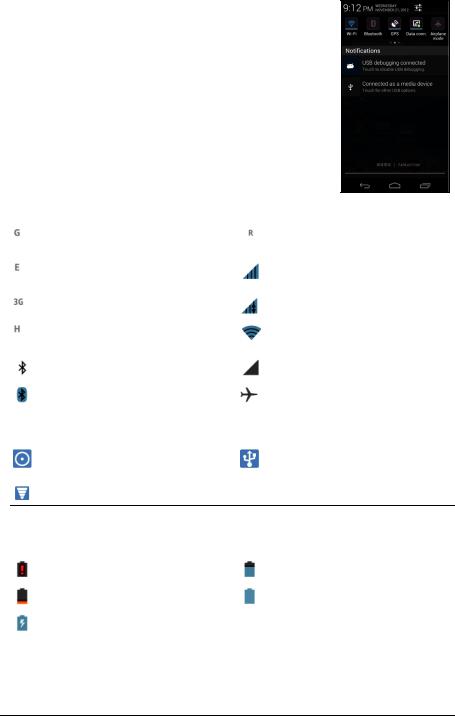
This area contains a variety of icons to inform you of your phone’s status. The left side of the Notification area displays event icons that indicate a new event (such as a new message). The icons on the right side indicate signal strength, connection, battery status and the time.
Drag the Notification area down the screen to view more information about new events adjust commonly used settings.
Connection icons
Icon |
Description |
Icon |
Description |
|
Connected to GPRS mobile |
|
Roaming |
|
network |
|
|
|
|
|
|
|
Connected to EDGE mobile |
|
Cellular signal strength |
|
network |
|
|
|
|
|
|
|
Connected to 3G mobile network |
|
Mobile data transferring |
|
|
|
|
|
Connected to HSDPA network |
|
Connected to a wireless |
|
|
|
network |
|
|
|
|
|
Bluetooth is on |
|
No signal |
|
|
|
|
|
Bluetooth connected |
|
Airplane mode (Wireless |
|
|
|
connectivity disconnected. |
|
|
|
Please disable airplane mode |
|
|
|
before trying to make a call.) |
|
|
|
|
|
USB and wireless tethering are |
|
USB tethering is activated |
|
activated |
|
|
|
|
|
|
|
Wireless tethering is activated |
|
|
Battery icons
Icon |
Description |
Icon |
Description |
|
|
Battery is very low |
|
Battery is partially drained |
|
|
|
|
|
|
|
Battery is low |
|
Battery is full |
|
|
|
|
|
|
|
Battery is charging |
|
|
|
|
|
|
|
18
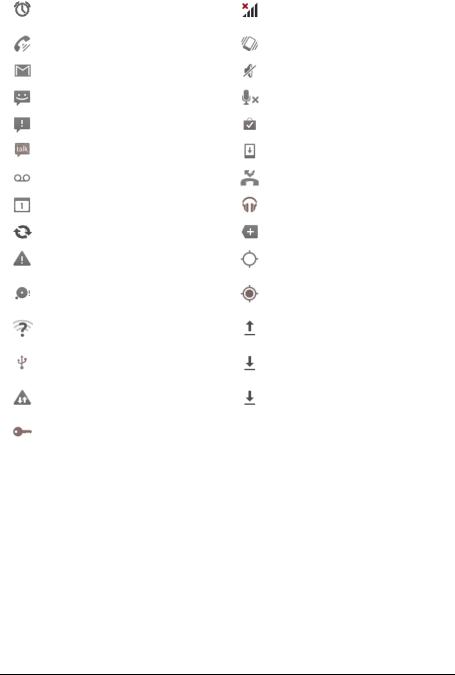
Notification icons
Icon |
Description |
Icon |
Description |
|
Alarm is set |
|
SIM card is invalid or not |
|
|
|
installed |
|
Speakerphone is on |
|
Vibrate mode |
|
|
|
|
|
New Gmail message |
|
Ringer is silenced |
|
|
|
|
|
New/unread SMS/MMS |
|
Phone microphone is off |
|
|
|
|
|
Problem with sending SMS/MMS |
|
Application update available |
|
|
|
|
|
New Google Talk message |
|
System update available |
|
|
|
|
|
New voicemail |
|
Missed call |
|
|
|
|
|
Upcoming event |
|
Song is playing |
|
|
|
|
|
Syncing data |
|
More notifications |
|
|
|
|
|
Warning, open the notification |
|
GPS is on |
|
area for more information |
|
|
|
|
|
|
|
SD card or USB storage is full |
|
Receiving location data from |
|
|
|
GPS |
|
|
|
|
|
An open wireless network is |
|
Uploading data |
|
available |
|
|
|
|
|
|
|
Phone is connected to PC via |
|
Downloading data |
|
USB |
|
|
|
|
|
|
|
Carrier data use threshold |
|
Download finished |
|
exceeded |
|
|
|
|
|
|
|
Connected to or disconnected |
|
|
|
from virtual private network |
|
|
|
(VPN) |
|
|
|
|
|
|
19

Multitasking
You can have multiple applications open at the same time. To open a new application, tap  to return to the Home screen, then start the new application.
to return to the Home screen, then start the new application.
To view your active applications, tap  . Then tap an icon to go to the application.
. Then tap an icon to go to the application.
Tip: To prolong battery life, it is better to close an application when you’ve finished using it. Do this by either pressing the Back key or the Menu button and selecting Exit (if available).
20

Managing contacts
Managing your contacts
Your smartphone features an address book that allows you to save contacts to either the internal memory or onto your SIM card.
Open the People application from the Application menu or tap  from the Dialer to view your contacts.
from the Dialer to view your contacts.
If you don’t have any contacts stored on your phone, you can import your Google account contacts, add a new contact or import contacts from your SIM or SD card. Open the People application from the Application menu and then
tap  to add a contact,
to add a contact,  to search for a contact, or tap the Menu button to open the menu.
to search for a contact, or tap the Menu button to open the menu.
Adding a contact
Tap  to add a new contact. You may also scan a person’s profile barcode to add the person to your contact list or group.
to add a new contact. You may also scan a person’s profile barcode to add the person to your contact list or group.
To create a contact, first choose where you want to store the contact’s information. You will then be asked to enter the contact’s information, such as name, address, and phone number.
You may scroll down the page and tap Add another field to add things such as:
•IM addresses.
•Add any personal notes about the contact.
•Phonetic name
•Link a website
To assign an image to your contact, tap the silhouette and select whether to take a photo or select an image from your smartphone’s picture gallery.
When done, click Done at the top of the screen.
Tapping on the contacts name will bring up their profile. Tap
while viewing a contact’s profile to edit, share, delete, or print the contact. You may also set a ringtone for the contact, or associate the contact with a SIM card.
Tip: You may also create a contact from an already dialed or received number, see "Saving a dialed number to contacts" on page 25.
21
